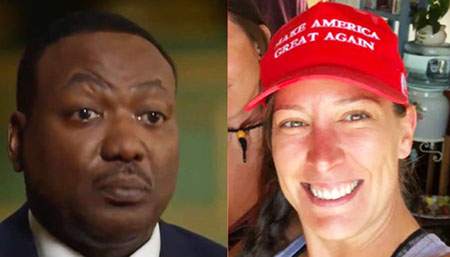by WorldTribune Staff, January 13, 2022
The U.S. Capitol Police lieutenant who shot and killed Ashli Babbitt on Jan. 6, 2021 was cleared of criminal wrongdoing without even being subjected to an interview by investigators, a report said.
Lt. Michael Byrd “didn’t provide any statement to [criminal] investigators and they didn’t push him to make a statement,” Babbitt family attorney Terry Roberts said in an interview with RealClearInvestigations (RCI). “It’s astonishing how skimpy his investigative file is.”

The lawyer’s account appears to be backed up by a January 2021 internal affairs report, which notes Byrd “declined to provide a statement,” according to Washington, D.C. Metropolitan Police Department (D.C. MPD) documents obtained via the Freedom of Information Act by Judicial Watch.
RCI’s Paul Sperry noted that a D.C. MPD spokeswoman confirmed that Byrd did not cooperate with internal affairs agents or FBI agents who jointly investigated the killing of Babbitt, who was unarmed.
“MPD did not formally interview Lt. Byrd,” deputy D.C. MPD communications director Kristen Metzger said. And, “He didn’t give a statement while under the U.S. Attorney’s Office investigation.”
Yet, in a friendly interview with NBC News personality Lester Holt, Byrd claimed: “There’s an investigative process [and] I was cleared by the DOJ [Department of Justice], and FBI and [the D.C.] Metropolitan Police,” adding that the Capitol Police also cleared him of wrongdoing and decided not to discipline or demote him for the deadly shooting.
Byrd was cleared in April of criminal wrongdoing by the DOJ, which “declined to impanel a grand jury to hear evidence in a departure from other lethal police-shooting cases involving unarmed citizens,” Sperry noted.
Roberts questioned how investigators could find that Byrd acted in self-defense and properly followed his training procedures, including issuing warnings before shooting Babbitt, since he refused to talk about it while the investigation was open when Byrd’s statements, unlike those made to NBC, would have been taken under penalty of perjury.
“How would they know if they never interviewed him?” Roberts said, adding that it’s not enough to say an officer did nothing wrong without showing how it reached such a finding.
By avoiding an interrogation, Roberts said Byrd avoided saying anything that could have been used to incriminate him, including making false statements to federal agents, which would be a felony.
Citing people familiar with the case, Sperry noted that Byrd “did not formally invoke his Fifth Amendment right to remain silent … which makes the reluctance of authorities to lean on him or sanction him for not cooperating all the more puzzling. By law, federal agencies can use leverage short of termination, such as an unwelcome duty reassignment, to persuade employees to cooperate with investigators.”
Byrd was put on paid administrative leave during the investigative process.
Byrd did not speak publicly “until after his statements could no longer be used against him in a criminal probe,” Sperry noted. “The heavily promoted NBC ‘exclusive’ told only his account of what happened with no opposing viewpoints.”
Texas Republican Rep. Troy Nehls, a former sheriff, said Babbitt’s shooting should have been presented to a federal grand jury: “This case was mishandled from the very beginning. Many officers in the USCP I have spoken to believe the investigations of Lt. Byrd were dropped because of his position and other political considerations.”
Byrd remains the commander in charge of security for the House of Representatives.
INFORMATION WORLD WAR: . . . . How We Win . . . . Executive Intelligence Brief
